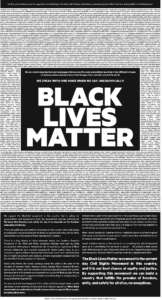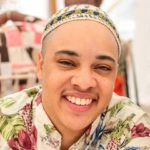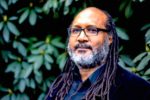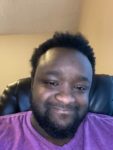Black Lives Matter. These three words seem so simple, but they have caused so much division, primarily along color lines. And that includes how the phrase makes some white Jews uncomfortable, for a variety of reasons. That shouldn’t be the case, decry some Black Jews who say white Jews have long been champions of civil rights for African Americans and the whole Jewish community should stand with them today, just as they did 57 years ago.
Today, August 28, is the anniversary of the 1963 March on Washington. That day, when Dr. Martin Luther King, Jr. delivered his “I Have a Dream” speech from the steps of the Lincoln Memorial, several Jews stood present in solidarity. One in particular, Rabbi Joachim Prinz, also spoke to the crowd. He proclaimed that “America must not become a nation of onlookers! America must not remain silent! Not merely Black America, but all of America. It must speak up and act, from the President down to the humblest of us…”
The latest groups to act are America’s sports teams. Several NFL teams canceled practices, and the NBA, WNBA, Major League Soccer, Major League Baseball, and National Hockey League called off some games this week, leaving behind t-shirts that say “Black Lives Matter.” The most-recent impetus: Jacob Blake of Kenosha, Wis., who was shot seven times in the back by a police officer. This paralyzing tragedy enraged and then energized many Americans in a call for change just as the police killing of George Floyd did in the weeks since his May 25 death.
This summer, more than 600 Jewish organizations and synagogues, including Jewfolk Inc. — TC Jewfolk’s parent organizations — and others here in the Twin Cities, signed on to a statement that says, in part:
 “We speak with one voice when we say, unequivocally: Black Lives Matter. We support the Black-led movement in this country that is calling for accountability and transparency from the government and law enforcement. We know that freedom and safety for any of us depends on the freedom and safety of all of us.”
“We speak with one voice when we say, unequivocally: Black Lives Matter. We support the Black-led movement in this country that is calling for accountability and transparency from the government and law enforcement. We know that freedom and safety for any of us depends on the freedom and safety of all of us.”
Enzi Tanner, a social worker and member of another signer, Shir Tikvah in Minneapolis, said he remembers when the Movement for Black Lives was first gaining traction nationally a few years ago. “There was an immediate call by some local Jewish organizations to denounce Black Lives Matter. They were denouncing them even though they had no relationship with anyone from the Movement for Black Lives.”
The Movement for Black Lives (M4BL) coalition is distinct from the rallying cry “Black Lives Matter.” M4BL brings together organizers, activists and leaders of all kinds for a conversation about building a black community agenda to effect change. Today, it is holding The Black National Convention, a livestreamed, multi-hour broadcast.
Jews who have criticized the movement and taken offense at the phrase “Black Lives Matter” often cite how, in 2016, M4BL issued a platform with about 40 policy suggestions, one of which called for boycotts, divestments from, and sanctions against Israel. It called the Holy Land an “apartheid state.”
As the JCRC noted, this very small section of the platform was written by a couple of individuals, separate from the other authors. The platform, as a whole, primarily covers domestic issues from U.S. policing to education reform to mass incarceration and abolishing the death penalty.

Graie Hagans
“For me, thinking about the Movement for Black Lives, how can I not be in favor of a movement for freedom?” says Graie Hagans, who is both Black and Jewish and is encouraging others to attend the Black National Convention.
Hagans is a community organizer and trainer with the Philadelphia-based Jewish action group, Bend the Arc: Jewish Action, which also signed the document in support of Black Lives Matter. “If part of our calling, as I have always been told about Judaism, is to do work of repair, we cannot continue to act as if our safety and security is wrapped up in someone else’s oppression.”
Rabbi Jacob Blumenthal, CEO of the United Synagogue of Conservative Judaism, has some advice for those who are conflicted about supporting M4BL. “I think the most important thing in this moment is to look at issues of systemic racism and make sure that we are not avoiding that because there are issues that we may not agree with that are supported by the leaders of the Black Lives Matter movement.”
Rabbi Blumenthal adds: “We know that the protesters and others affiliated as allies are diverse and their main goal is to uproot the systemic racism and prejudice that is a part of our society. I am sure the Jewish community has many allies who have supporters who agree with most of our agenda and our basic values, even though they may disagree with certain specific things.”

Professor Lewis Gordon
Prof. Lewis Gordon, who heads the philosophy department at the University of Connecticut and specializes in culture and race, takes a similar point of view. “Blacks are always being prodded to work with whites who hate us. We work with whites because there is a problem greater than their hatred of us. It’s a fight for humanity. There have been (white) Jews who have been committed to those causes, and they understand that the [Black Lives Matter] issue is a fight for democracy.”
The hashtag #BlackLivesMatter first emerged in 2013 with the acquittal of George Zimmerman for the murder of Trayvon Martin, a Black teenager in Florida. Its use grew stronger as demonstrations sprouted all over the world after the 2014 and 2015 police killings of two African Americans: Mike Brown in Ferguson, Missouri, and Eric Garner in New York City. In 2020, the same issue with police and vigilantes unleashing bullets or deadly force on African Americans abound.
A post on the Black National Convention’s website says, “To defend Black life means that not one person is killed senselessly by their government or a city official. It is not enough to say we shouldn’t be murdered…murder is already illegal in this country. What we want is for people to say we defend Black life because we want to celebrate you in the living.”

Enzi Tanner
Tanner, who said he is going to try to attend the Black National Conference, added that “Sometimes Jews see Blacks as ‘others.’ Even if they are perceived as the other, Jews should care — they should care about everyone in society. The Movement for Black Lives is the very essence of who we are as a society — it says that we are committed to those who are the most vulnerable in our society. None of us can get free until we are all free.”
“Free at last” was among the concluding words Dr. King proclaimed in his speech 57 years ago. But just as he dreamed for “that day when all of God’s children, Black men and white men, Jews and Gentiles, Protestants and Catholics, will be able to join hands…” Many Black Jews dream of the day when all Jews can stand in solidarity and exclaim from their actions and in words: “Black Lives Matter.”

















